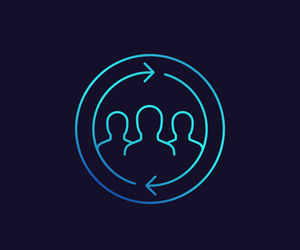Millennials recently overtook Baby Boomers as the largest living generation in the United States and it’s time for the life insurance industry to start adapting to the needs of their largest base of prospective clients.
For years, the term “Millennial” has been a catch-all for young people. But the generation isn’t quite as young as many think. According to the Pew Research Center, Millennials are now ages 24 to 39 and number 72.1 million. While less traditional than previous generations, they are entering or are already in their prime working years, starting households and acquiring wealth—not to mention their purchasing power is currently estimated around $2.5 trillion.
Yet only half of Millennials have life insurance, according to a recent AIG Life & Retirement survey. There’s a lot at stake for the life insurance industry when it comes to this generation. Not only are most Millennials uninsured or underinsured, but they also stand to inherit trillions in wealth from their Baby Boomer parents in what is known as the “Great Wealth Transfer.”
Advisors need to further connect with Millennials to avoid a shrinking customer base and losing out on the Great Wealth Transfer. Here’s what life insurance advisors need to know about Millennials and how to connect with them.
Understanding Millennials & Life Insurance
From a life insurance perspective, there are a few key attributes to understand Millennials:
- Conservative with finances. Rocked by the Great Recession, student debt, and rising healthcare and housing costs, Millennials are generally financially conservative, focused on savings, and looking to make prudent financial decisions.
- Lack education on life insurance. While limited resources and lack of dependents have been popular explanations for why Millennials aren’t buying life insurance, research by IBM iX found that the number one impediment was confusion about policy specifics or even the general need for life insurance. However, 70% said they’d be likely or very likely to buy life insurance if they understood offerings and benefits better.
- Dislike inconvenience. Convenience is a core desire of Millennial consumers. Tech-savvy and always on the go, what they fear most about life insurance is a drawn-out and complicated process that involves long meetings, scheduling a medical exam, and paperwork. Their busy lifestyles can cause them to feel self-described as “errand fatigue” or “burnout,” so they will search for easy, frictionless solutions.
- Willing to share data. Rather than being wary of digital platforms, Millennials are interested in sharing data if it can increase the efficiency of the life insurance process or provide them with better or more personalized solutions.
- Loyalty must be won. Millennials don’t give their loyalty to businesses; it must be earned. They are more likely to switch providers and be open to new entrants in the insurance field, including insurtechs.
Based on these attributes, we can find several best-of recommendations that life insurance advisors can follow to attract Millennial clients.
Education & Digitization
The life insurance industry must focus on educating this generation on the value of life insurance, how it works, and why setting up a policy when you’re younger can pay dividends down the line. And cold calling or emailing won’t be the way to educate. Millennials start their research online, so it’s important to meet them where they are with a simplified, mobile-friendly website.
But don’t just think of digital technology in terms of client acquisition. It’s important to consider the entire customer journey. Millennials want to simplify processes as much as possible through digital technology. Advisors should consider tools like e-signatures, e-delivery and e-applications or, more broadly, a secure digital platform that consolidates processes and increases connectivity.
Connectivity & Communication
Insurance has long been a low-touch industry, but new research from Bain shows that connectivity is key to success with Millennials. Those who had increased connectivity with their insurance providers through digital platforms or tools were more loyal to their provider, rated them more highly, bought multiple products and gave more recommendations to family and friends.
For life insurance advisors, new digital platforms, like Link by LegacyShield, offer the connectivity that Millennials desire. This type of platform allows them to communicate and collaborate with their advisors in a secure virtual workspace. Documents, policies and information can be shared in one convenient digital location, increasing efficiency and organically building stronger relationships.
Strong relationships and brand loyalty will be critical to keeping Millennial clients as well as bridging the gap between your older clients and their Millennial children. To learn more about retaining multigenerational clients, check out our blog, “Break the Rule of 66.”





